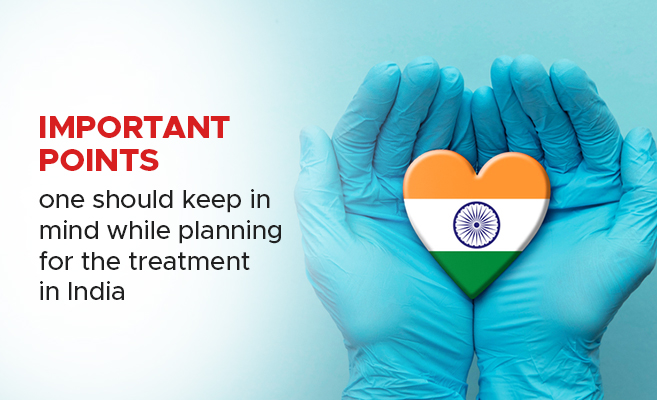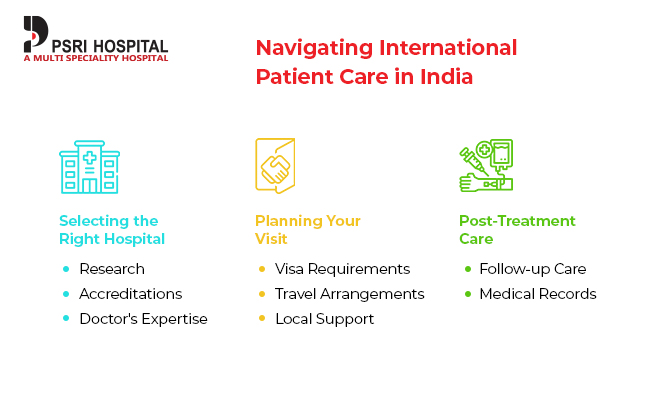Important Points One Should Keep in Mind While Planning for The Treatment in India

If you’re considering travelling to India for medical treatment, you’re not alone. In recent years, India has earned a well-deserved reputation as a global destination for medical treatment. It’s a place where cutting-edge healthcare intersects with affordability, drawing patients from all corners of the world. If you’re considering a journey to India for medical reasons, you’re in good company.
In this blog, we’ll explore some essential points to keep in mind while planning your medical treatment in India for international patient care.
Understanding India’s Role in Medical Tourism
India Medical Tourism: A Global Trend
Medical tourism in India has witnessed significant growth over the years. Patients from countries like the United States, Canada, the United Kingdom, and many others travel to India for a wide range of medical procedures. The primary reasons for this trend are:
- The cost-effectiveness of treatment.
- High-quality healthcare facilities.
- The availability of skilled medical professionals.
Navigating International Patient Care in India (Points to Keep in Mind)

Selecting the Right Hospital
- Research: Extensive research is essential when choosing a hospital in India. Look for hospitals with a strong reputation for the specific medical procedure you require.
- Accreditations: Check if the hospital has international accreditations from organisations like JCI (Joint Commission International) or NABH (National Accreditation Board for Hospitals & Healthcare Providers).
- Doctor’s Expertise: Verify the qualifications and experience of the doctor who will be treating you. Online reviews and patient testimonials can provide valuable insights.
Planning Your Visit
- Visa Requirements: Verify that you have the necessary medical visa before travelling for treatment. Supporting documentation from the hospital can be needed for this procedure.
- Travel Arrangements: Arrange your travel plans, including lodging and aeroplane reservations. Many medical facilities provide support with travel arrangements.
- Local Support: During your visit to India, having a local contact or a medical facilitator might be very beneficial. They can help with practicalities like transportation and translation.
Post-Treatment Care
- Follow-up Care: Talk to your doctor about your post-treatment care plan. Understanding any required follow-up appointments or prescriptions is crucial.
- Medical Records: Make copies of all your medical records, including test results and treatment summaries, for future reference.
The India Medical Tourism Pros and Cons
Pros of Medical Tourism
- Cost-Effective Treatment: One of the biggest benefits of receiving medical care in India is the cost savings. When compared to Western nations, medical operations in India are frequently less expensive, making it a desirable choice for people without full health insurance.
- High-Quality Healthcare: India is home to advanced hospitals and medical professionals of the highest quality. International organisations have accredited many hospitals in India, providing high-quality care.
- Minimal Wait Times: Compared to many other countries, India frequently offers short scheduling for medical procedures.
- Tourism Opportunities: Combining medical treatment with tourism is a unique feature of medical tourism in India. While receiving treatment, you can explore the country’s rich cultural heritage and natural beauty.
Cons of Medical Tourism
- Distance and Travel Expenses: Going to India might be a long journey; therefore, consider the travel costs. It’s crucial to take in travel costs, lodging, and local transportation when planning a trip to India.
- Cultural Differences: Getting used to a new environment and culture can be difficult. However, the majority of institutions that treat patients from other countries offer a comfortable and friendly environment.
- Language Barrier: Despite the fact that many healthcare workers in India speak English, there may still be a language barrier. It is advisable to have a local contact or interpreter to facilitate communication.
Understanding International Healthcare Insurance
The Need for International Health Insurance
International healthcare insurance provides coverage for medical expenses incurred abroad, giving you peace of mind during your treatment.
Key Points About Healthcare Insurance for International Patient Services
- Coverage Types: The coverage offered by international health insurance policies varies. Make sure your insurance covers the particular treatments you want in India.
- Pre-Existing Conditions: Be aware that overseas insurance may not always provide coverage for pre-existing conditions. Make sure to read the policy and provide your medical background properly.
- Emergency Evacuation: Look for insurance that covers evacuation in case of emergency. Occasionally, moving to another facility for specialised care may be required.
- Network Hospitals: A few insurance companies collaborate with Indian hospitals. Selecting a network hospital can make billing easier.
Conclusion
In conclusion, India has become a top location for medical tourism, providing a balance of high-quality healthcare services at affordable prices. But it’s important to carefully organise your medical trip, from picking the best facility to ensuring you have enough international health insurance. You can start a successful medical treatment journey in India by considering these crucial factors and putting your health and well-being first.
Remember, your health is precious, and thorough preparation will help you make the most of your medical tourism experience in India. If you are an international patient, PSRI Hospital is the best place. Book an appointment now to know more.
FAQs
Q1: How can I find a reputable hospital or clinic in India for my medical treatment?
Answer: Finding a reputable healthcare facility in India is crucial. Start by researching hospitals and clinics that specialise in your specific medical condition. Look for institutions accredited by international organisations like JCI (Joint Commission International) or NABH (National Accreditation Board for Hospitals & Healthcare Providers). Online reviews, recommendations from medical professionals, and patient testimonials can also provide valuable insights into the hospital’s reputation.
Q2: Will language be a barrier when communicating with healthcare professionals in India?
Answer: While language barriers can exist, many healthcare professionals in India are proficient in English, especially in major cities and renowned hospitals. To ensure effective communication, consider using a local contact or interpreter who can assist you during your medical journey.
Q3: How can I navigate India’s visa and travel requirements for medical treatment?
Answer: You’ll typically need a medical visa to travel to India for medical treatment. Contact the Indian embassy or consulate in your home country for detailed visa requirements and application procedures. The hospital or medical facilitator you choose may assist with the visa process by providing the necessary documentation and support. Ensure your passport is valid for at least six months beyond your planned stay in India.

 Book An Appointment
Book An Appointment Virtual Consultation
Virtual Consultation




